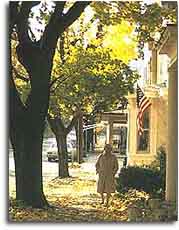 At first glance, the term Urban Forestry may seem like an oxymoron. People tend to think of urban places as cities, while forestry evokes images of parks or other large tracts of woodland. These are certainly contradictory images.
At first glance, the term Urban Forestry may seem like an oxymoron. People tend to think of urban places as cities, while forestry evokes images of parks or other large tracts of woodland. These are certainly contradictory images.
So let's take a closer look at the term Urban Forestry. According to the U.S. Census Bureau, an urban area is a place with a population of at least 2,500 people. This definition encompasses most of the cities and towns in Maryland. Forestry refers to individual parks, yards and street trees, as well as forest fragments such as wooded parkland, unimproved lots and naturally regenerating areas.
Urban Forests are generally, though not exclusively, thought of as providing services; recreation, aesthetics, wildlife habitat, stormwater management, carbon storage and interception of airborne pollutants for example. Currently, there are goals to improve water quality be reducing water quantity in urban areas by increasing the Urban Tree Canopy and thereby reducing surface runoff. This differs from the traditional view of forests as primarily providing goods like lumber, pulpwood or firewood.
The Maryland Department of Natural Resources Forest Service is the state agency responsible for the management and protection of the state's urban forestry resources. The group within the Forest Service with direct oversight of these resources is called the Urban and Community Forestry Program (U&CF).
Laws that protect trees:
-
Forest Conservation Act applies to any activity requiring an application for a subdivision, grading permit or sediment control permit on areas 40,000 square feet or greater. Private projects are reviewed at the local planning and zoning office. All others are reviewed by the Maryland Forest Service.
-
Maryland Reforestation Law applies to all highway construction projects utilizing $1 or more of State funding and impacting 1 acre of forest.
-
Maryland Tree Expert Law requires anyone seeking to practice or advertise tree care services in the State of Maryland to obtain a license from the Maryland Department of Natural Resources.
-
Roadside Tree Law requires to anyone providing tree care to a roadside tree to obtain a Tree Care Permit from the MD Department of Natural Resources prior to performing the work.
Volunteer Opportunities
Recognition Programs:
Publications: